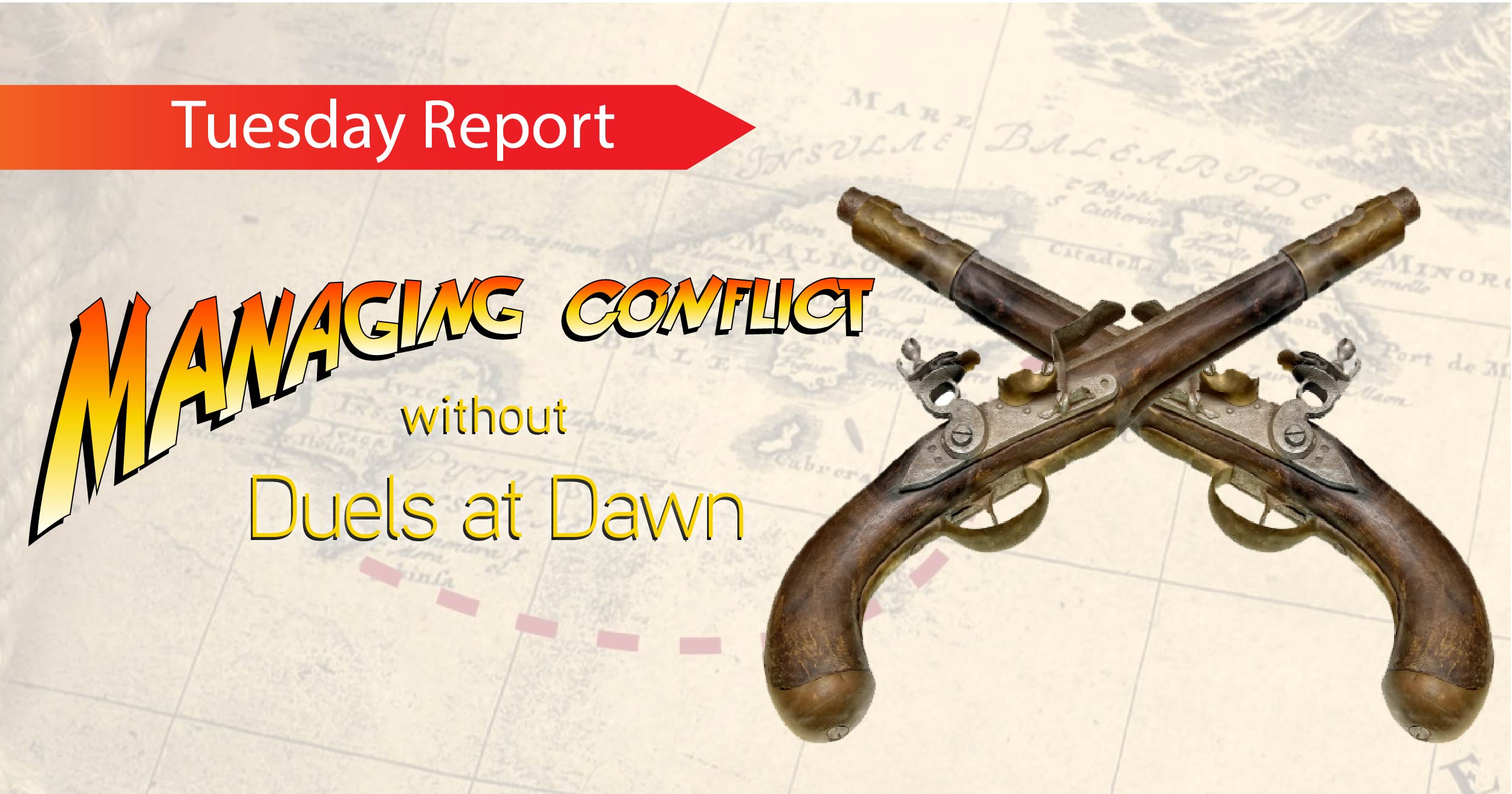I don’t know about you, but I think that how we manage conflict is perhaps the biggest determinant of how life will go for us.
How we manage conflict will determine who we’ll love, how we’ll fit into groups, where we’ll work, how successful we’ll be—and whether we’ll end life alone or surrounded by family and friends.
Managing conflict has never been easy for me, and I find that it is a primary issue for our clients and for people around us.
Conflict is almost as inevitable as breathing.
It begins when we’re babies, spewing food out of our mouths into the dismayed face of our parent, letting her know that you are not about to eat that mushy stuff from the Gerber’s jar—with the cute little baby’s face laughing back at you.
From those first moments, conflict is part of a great many moments of our lives.
In point of fact, if you scratch the surface of a human being you’re apt to have a fight on your hands. It’s easy to forget that men settled differences at dawn with pistols in their hands just over a century ago. Settling disputes person to person, apart from any legal process, had people squaring off until the beginning of the 20th Century
In America’s most famous duel, Alexander Hamilton, author of the American economy, and Aaron Burr, Thomas Jefferson’s Vice President, squared off in a duel on July 11, 1804. Defending one’s honor was a sacred duty, and Hamilton had attacked Burr repeatedly in newspaper and magazine articles. When they met at 7:00 AM, Hamilton’s shot reportedly missed Burr, but Burr’s shot reached its mark and Hamilton died the next day.
The idea that someone might fight to the death to avenge what someone had said seems both darkly savage and strangely quaint today. An apology would stop the duel. In fact, Abraham Lincoln narrowly avoided a duel for ridiculing an opponent; Lincoln simply apologized to avoid a fatal outcome.
Managing Conflict without the Pistols
From settling conflicts by duels at dawn to today’s organizational approach of resolving differences through open, honest, and frank communication is a monumental shift in approach that often doesn’t track the way we really operate as human beings.
The truth is that we have to be extremely careful what we say, and to whom we say it. Even if the elephant is sitting in the middle of the room in plain view and everyone knows it, to point that out in the wrong way will endanger both you and the elephant.
There can be radical candor in organizations, but you have to know what you can be radically candid about—even in an organization that practices a lot of candor, there must be boundaries. I doubt that the kind of candor where people can say anything they want at any time actually exists. People are more open or less open, but transparent people I do not know.
Conflict is basically good—it’ what makes the world move forward. I know that managing conflict is key, and that doesn’t always make my very happy. A few people genuinely love conflict, and I’m not one of them. But I’ve learned to manage conflict over the years and to appreciate the value that comes from it.
Here are some guidelines for managing conflict.
- First Manage Your Own Inner Conflicts. Conflict originates from within ourselves. As we experience inner conflict—frustration, anger, gullt, agreession—these inner conflicts engage with other people’s negative feelings. The more we resolve our inner conflicts, the more expertly we can handle the outer conflicts that come our way.
- Conflict Takes Place Best Among Friends—Trust Is the Foundation. It’s amazing what you can say among a group of trusting friends or colleagues—you can kid each other, banter, and say things you can’t just say to anyone. Trust is built by knowing each other, your histories, wins and failures, and traveling the same road. As trust emerges, so does transparency and comfortable truth.
- Create the Group Goal—Then It’s Strategy, not Conflict. Teams united in a common missioncan have comfortable conflict.As people share a common mission, they become more empathetic with each other because they have a passion to get to the same place. At that point it’s not a conflicted meeting—it’s a strategy session to get to a goal.
- Conflict Creates Invention—Stay in a Problem Solving Mode. Conflict at its best can be a tool for creativity and innovation—when team members stay in a problem solving mode. We find that teams move from goals to gouging each other. They weaponize words—attacking team members for wrong attitudes, weak thinking, and lack of commitment. They slip from solving a problemto making things personal. Conflict must include the rules of the road. There must be a sense of what is out of bounds.
- Keeping the Team Together. In sports teams, rivalry, pride and envy sometimes get to the point of negatively impacting team performance. Yet it’s hard to imagine a sports team that after a practice session simply said, “I’m out of here. I’m done with these people.” At that point the team can no longer function. Teams have stars but there is no conflict that should be allowed to rip the team apart. Managing conflict is the key to keeping teams intact. There must be commitment to the team that is more intense than conflict.
Managing conflict is a key to a leader’s success. Conflict can sink the best work of organizations…or raise your organization to new heights of innovation and execution. It is a key skill.






